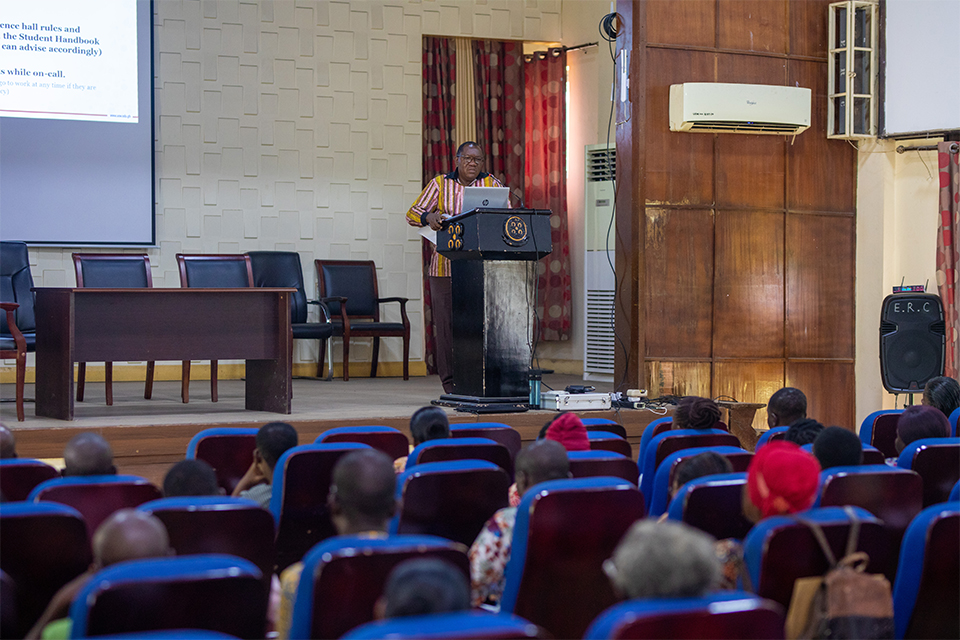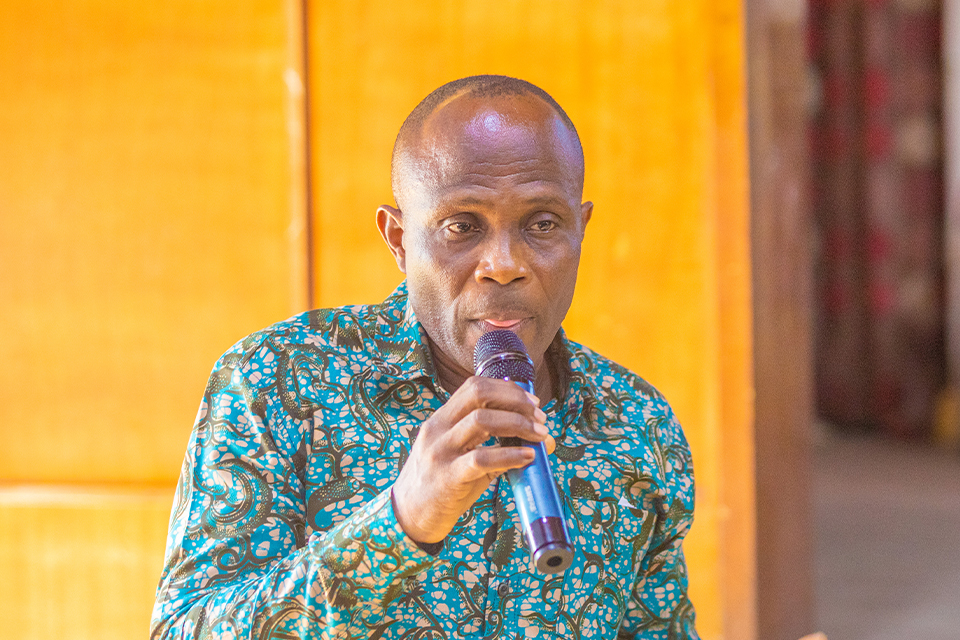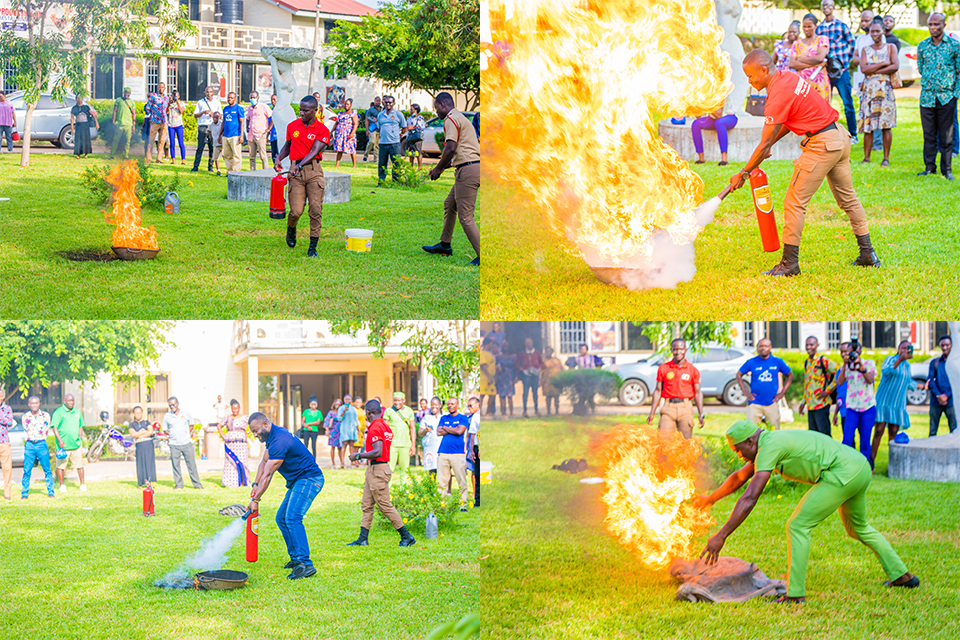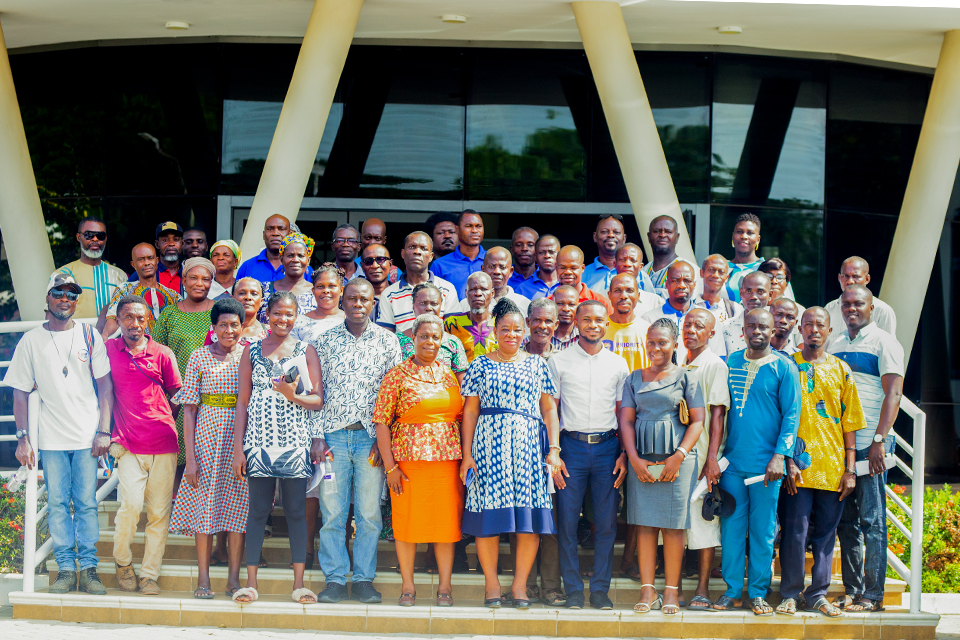UEW Hall Assistants Undergo Professional Development Training

To enhance the quality of student support services, the University of Education, Winneba (UEW), conducted a comprehensive professional development training seminar for its hall assistants ahead of the upcoming 2024/2025 academic year.
The training session was designed to enhance the preparedness of essential staff members in their roles related to the accommodation of incoming students. This event was conducted at the North Campus Mini-Conference Room and included insightful presentations that addressed critical aspects of student service and safety.

Mr. Reginald Sitsofe Agbo, the Manager of Ghartey Hall and a resource person, offered valuable insights on hall management and the critical importance of cultivating a supportive student environment. He underscored the distinctive role hall assistants play in enhancing the overall student experience beyond the confines of the classroom.
Mr. Agbo outlined key responsibilities, including providing administrative support, facilitating conflict resolution, and safeguarding student welfare. He asserted, “Every interaction you have shapes the perception of the university,” encouraging participants to adopt a mindset characterised by professionalism and empathy.
Mr. Agbo articulated the importance of aligning the responsibilities of staff members with the mission and core values of UEW, which encompasses academic excellence, inclusivity, and environmental responsibility. He emphasised the critical role of teamwork, encouraging open communication and experiences among hall staff to cultivate a cohesive team capable of effectively addressing challenges. Furthermore, Mr. Agbo underscored the necessity for hall assistants to serve as role models, affirming, “Your dedication fosters a safe, inclusive, and enriching environment for our students.”

Ms. Rebecca Techie-Menson, Head of Employee Relations at the Division of Human Resource, UEW, during her presentation on client services, offered hall assistants a fresh perspective on their roles, emphasising the importance of treating students as valued clients and delivering exceptional service. Her session was both thought-provoking and practical, equipping participants with strategies to elevate student satisfaction.
Ms. Rebecca Techie-Menson highlighted the need for hall assistants to see students as their primary clients, whose satisfaction directly influences the university’s reputation and enrolment numbers. She delved into actionable strategies such as effective communication, conflict resolution, and maintaining accurate records. “Positive interactions with students can lead to lifelong ambassadors for UEW,” she remarked. She also shared anecdotes to illustrate the impact of empathy and patience in handling challenging situations.

Squ. Ldr. Daniel Kwaku Sapey (Rtd.), Head of the Directorate of Security Services at UEW, who addressed hall assistants on campus security, equipped them with critical knowledge to ensure a safe and secure environment for students and staff. He highlighted the importance of situational awareness, stating, “Only you can protect yourself by being aware of your surroundings and taking appropriate steps to prevent crime.”
Squ. Ldr. Sapey (Rtd.) detailed the roles of campus security, including access control, patrolling, and investigations, and urged hall assistants to collaborate closely with security personnel. He encouraged participants to report irregularities promptly, adding, “Your vigilance is our strongest defence against potential threats.”

ADOI Frank Botwe, a fire safety officer from the Winneba Branch of the Ghana National Fire Service (GNFS), provided hall assistants with the knowledge and skills to handle fire incidents effectively. His hands-on approach left participants confident in their ability to respond to emergencies. He recounted the devastating impact of fire incidents, sharing real-life examples to emphasise the importance of prevention. He explained the fire triangle—heat, fuel, and oxygen—and demonstrated how disrupting one component can extinguish a fire.
ADOI Botwe provided participants with an overview of the various classes of fires and the appropriate methods for extinguishing each type. He highlighted the risks associated with using water on certain fires, such as those involving electrical sources or flammable liquids. Additionally, he introduced the use of fire extinguishers, foam concentrates, and other essential firefighting tools. Furthermore, he addressed evacuation protocols, emphasising calm and orderly conduct during emergencies. “Prevention is always better than cure,” he reiterated, urging hall assistants to prioritise fire safety in their daily practices.

The session featured a live demonstration of fire extinguisher use, with participants practising under his guidance. Participants expressed gratitude for the practical training and pledged to apply their newfound knowledge to enhance fire safety on campus.
With the arrival of new students just around the corner, the university’s commitment to professional development reflects its dedication to fostering a supportive and secure atmosphere within the campus community. The Hall Assistants, now better equipped with knowledge and skills, are poised to make a significant impact in the lives of students as they embark on their academic journeys.









